The Response - UWA Staff - The University of Western Australia
The Response - UWA Staff - The University of Western Australia
The Response - UWA Staff - The University of Western Australia
Create successful ePaper yourself
Turn your PDF publications into a flip-book with our unique Google optimized e-Paper software.
‘<strong>The</strong>re is significant potential to collaborate with other institutions on developing teaching materials…. Authors <strong>of</strong><br />
undergraduate textbooks at <strong>UWA</strong> could be stimulated to develop online resources to share with other universities,<br />
which will increase <strong>UWA</strong>’s web-presence as well as the sale <strong>of</strong> their textbooks…. For postgraduate units, it<br />
would be worthwhile exploring opportunities for co-taught units at the Masters or PhD level…. Where <strong>UWA</strong> has a<br />
comparative advantage in a certain field, it is worthwhile exploring the possibilities to widely advertise specialists<br />
units and open those up for enrolment from other universities. Such a possibility should be reciprocal, so that our<br />
Postgraduate students can get credits for units taken at other universities.’<br />
‘You expressed an opinion that we shouldn’t grant credit for content studied with free providers such as<br />
Coursera…. My concern is that the current advanced standing policy is silent on this point, and that I’d estimate<br />
that there are 30 or so people across campus who assess and approve credit (<strong>of</strong> whom I’m one) and who might<br />
well form their own diverse opinions in the absence <strong>of</strong> policy guidance. Thus, there’s a risk <strong>of</strong> an unintended<br />
precedent being established by an individual’s decision, which might be eliminated by the circulation <strong>of</strong> appropriate<br />
guidance to these staff members.’<br />
‘To the extent that entry into, and completion <strong>of</strong>, a degree program from a highly regarded, academically rigorous<br />
university is a strong signal <strong>of</strong> a student’s quality in the job market (independent <strong>of</strong> what he or she may actually<br />
learn while there) top students may still prefer to enrol in “traditional” programs at highly regarded schools. If so, we<br />
need to be especially vigilant with regard to standards and reputation. I agree that “Quality, quality, quality” is the<br />
way to go if we are to prosper in future.’<br />
2. Education<br />
‘We advocate that the <strong>University</strong> strive to achieve international best practice in terms <strong>of</strong> our educators and to<br />
continue to provide opportunities through pr<strong>of</strong>essional development and the teaching-research nexus. We therefore<br />
recommend the inclusion <strong>of</strong> an additional proposal to recognise, recruit and retain high quality educators as a<br />
strategic component in the attainment <strong>of</strong> best student education.’<br />
‘Is there anything we want to say about the teaching-research nexus? We have built research skill development<br />
explicitly into the UG curriculum under NC2012 and we claim to distinguish ourselves from other kinds <strong>of</strong> institution<br />
by the nature <strong>of</strong> learning in a research-intensive environment. Do we still believe this? Should it figure in the next<br />
iteration <strong>of</strong> our Strategic Plan? I would suggest it should but there are skeptics.’<br />
Proposal 1: That the <strong>University</strong> conduct a full review <strong>of</strong> pedagogic purpose and practice in 2013, with<br />
the aim <strong>of</strong> introducing new pedagogies from the beginning <strong>of</strong> 2015. <strong>The</strong> review will consider, among<br />
other factors:<br />
ÌÌ<br />
ÌÌ<br />
ÌÌ<br />
ÌÌ<br />
the effectiveness <strong>of</strong> different teaching styles;<br />
the preferences <strong>of</strong> students for different combinations <strong>of</strong> on-line and face-to-face learning;<br />
the technological and infrastructure requirements <strong>of</strong> different approaches to teaching and learning;<br />
the skills and capabilities required <strong>of</strong> teaching and support staff.<br />
General reactions:<br />
‘<strong>The</strong> challenge will be to provide for a diversity <strong>of</strong> approaches, which will be required across different disciplines,<br />
whilst maintaining overall coordination. Our current exploration <strong>of</strong> alternate pedagogy has been very piecemeal,<br />
<strong>of</strong>ten driven by the interests <strong>of</strong> the lecturer at the individual unit level. This has produced some very worthwhile<br />
initiatives, but meant that student experience varies widely from unit to unit…we need to ensure uniform<br />
engagement.’<br />
03 | www.uwa.edu.au


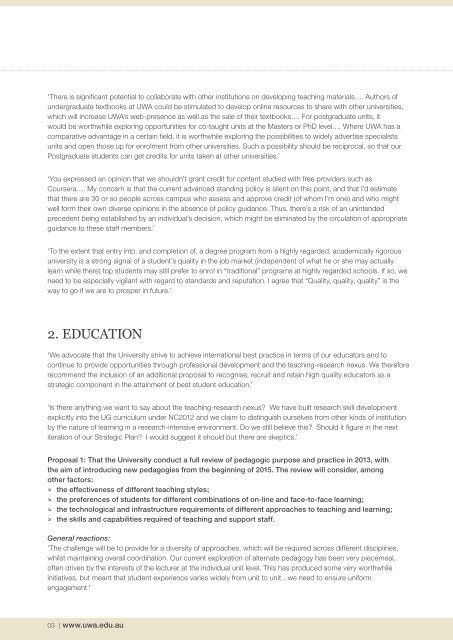
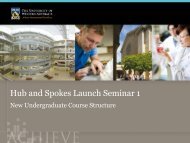
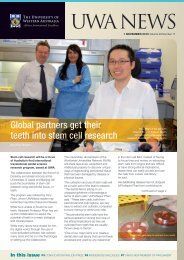
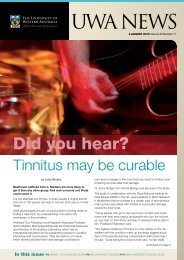
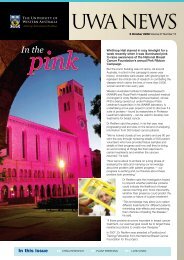
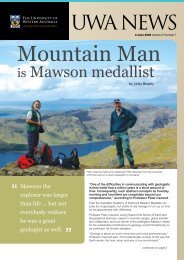
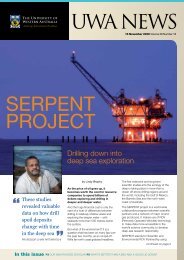
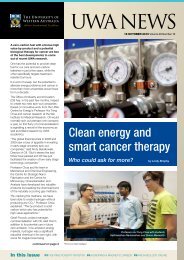


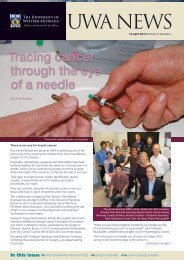
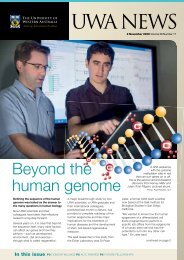
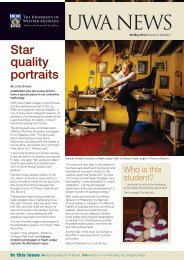
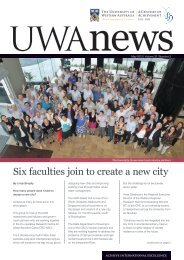
![Issue 13. 6 September 2010.pdf [PDF File, 1.7 MB] - UWA Staff - The ...](https://img.yumpu.com/26619782/1/184x260/issue-13-6-september-2010pdf-pdf-file-17-mb-uwa-staff-the-.jpg?quality=85)